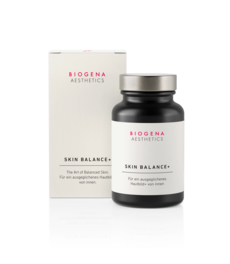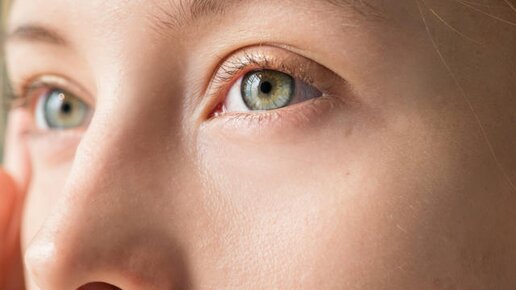Who hasn't been there before: full of anticipation for a special occasion, we look in the mirror in the morning and tadaaaa: there's a new pimple on our face, of course in an obvious place like the tip of our nose or as a painful bump in the middle of our forehead. The mission is: how do I get rid of it - not in 10 days, but as quickly as possible? Dermatologist Dr. Katharina Medek explains why pimples appear, how to treat them and what you can do to prevent them.
7 Tips: how to get rid of blemished skin
You suddenly have blemished skin and you can't wait until your doctor's appointment? Or you would like additional support for your skin? Then follow these tips:
- Consistent cleansing: in the morning and evening with special products for mixed or blemished skin
- Sun protection: daily use of non-greasy sun protection products with a light texture to avoid pimples
- Balanced diet: Reduce industrial sugar, dairy products, fast food, ... and increase foods with omega-3 fatty acids, vegetables and fruit.
- Combat blemished skin from the inside: with supplements such as vitamins A, C, D & E and anti-inflammatory ingredients such as frankincense, grape seed extract or omega-3 fatty acids.
- Avoid wearing too tight, synthetic clothing
- Avoid using too much make-up to cover up: use non-comedogenic BB or CC creams instead of thick layers of make-up to cover up
- Hands off: No looking in a magnifying mirror and squeezing and squeezing around, this only makes it worse and often results in scars
Beware of social media skincare trends:
Chlorophyll patches, skin icing, skin gritting, overnight zinc ointment, toothpaste, lemon juice, patches, masks and strips - social media such as TikTok and Instagram are currently presenting a seemingly new secret recipe for blemished skin every day. However, various measures recommended by non-medical professionals should be viewed with extreme caution, as anything with an effect can also have side effects, i.e. often have the opposite effect and damage the skin. It is therefore highly recommended that you see a dermatologist if you have blemished skin - right from the start and not just when large and deep pimples appear, which then heal with scars.
Causes for blemish prone skin
The question of ‘why?’ cannot usually be answered quickly and easily, as blemishes arise from a complex interplay of various factors. In addition to a family predisposition, hormonal changes, illnesses such as polycystic ovary syndrome (PCO) and side effects of medication, lifestyle (smoking, stress, alcohol, etc.), diet (industrial sugar, food additives, obesity, etc.) and environmental pollution (excessive sun exposure, air pollution, etc.) play a significant role in the development of blemished skin.
There are also reports that vitamin D deficiency can be linked to blemished skin or acne. Over-care or the use of the wrong care products, as well as insufficient care of the skin, can also pave the way for the development of spots. It is therefore important to determine the causes in a detailed discussion in order to find a suitable therapy and skin care routine.
One apple a day keeps the acne away? – how nutrition affects our skin
It has been scientifically proven that nutrition, via various biochemical markers, has an influence on sebaceous gland function and on the proliferation of bacteria, which promotes the progression of inflammation in acne. The hormones and growth factors contained in milk can worsen the skin's appearance if milk is consumed excessively. This is particularly common in athletes who regularly consume milk protein or whey protein shakes.
Equally, a correlation between blood sugar levels and acne has been described, which is why it is recommended to avoid industrial sugar and to reduce simple carbohydrates.
Furthermore, study results suggest that the use of probiotics can improve the appearance of the skin. These are said to alleviate inflammation, reduce pimples and redness and improve skin hydration by modulating the microbiome of the skin and intestines, depending on the application. However, further scientific observations and studies are needed to confirm this.
Fatty acids, vegetables and fruit tend to have a protective effect, so the following foods should be added to your shopping list, as they can have a positive impact on the inflammatory process: fish, cooking oils such as rapeseed oil, linseed oil, walnut oil, and plants, nuts and seeds such as chia seeds, linseed seeds, almonds, avocado and co.
Blemished skin during pregnancy
Girls bring pimples, boys bring the glow – is that true? According to various mummy blogs, experiences and popular opinion, you can see the sex of the baby on the skin of the pregnant woman. While girls supposedly cause blemished skin and brittle hair in the expectant mum, mummy-to-be, boy mums are spared. At least that's what they say.
It is a fact that more than 90% of all women experience complex skin changes due to hormonal changes during or after pregnancy. In addition to stretch marks, discolouration and dry skin, pimples and blemishes can disrupt the pregnancy glow.
The increased production of male sex hormones (androgens) leads to an overproduction of sebum and the cycle described above takes its course.
Severe skin problems in teenage years can be a risk factor for developing pregnancy acne. But here too, there is no pattern: in some women, acne even goes away during pregnancy, while in others it gets worse. And it can vary from pregnancy to pregnancy. In most cases, it then recedes as the female body adjusts to the hormonal changes.
A flare-up shortly before birth results from another change in the hormonal balance. By the way: stopping the pill can also trigger blemished skin, which is why many patients present at my practice. While the pill used to be prescribed very often for blemished skin, today this is only the case in certain situations, since we now have very effective, non-hormonal acne therapies available.
Blemished skin vs. acne:
While a pimple or small blemishes are annoying, but not really a tragic problem in individual cases, acne is a serious, very common skin condition that has a significant impact on self-esteem, mental health and thus on the quality of life of those affected. Millions of people worldwide suffer from this chronic inflammatory skin disease. Typically, acne occurs in phases. Chronic cases are just as familiar to us dermatologists as new cases caused by hormonal changes or in older age. In this case, I always recommend consulting a specialist.
Conclusion: Despite the tips for sudden skin blemishes and possible causes, you should have your skin analysed by a specialist: Specialists analyse the skin or acne type, discuss previous measures and create an individual treatment plan and skin care routine. This includes topical therapy with creams, tinctures and serums, peelings and other procedures such as medical needling, as well as systemic therapy with tablets or micronutrients.
Sources
Vora, RV., Gupta, R., Mehta, MJ., Chaudhari, AH., Pilani, AP., Patel, N. (2014). Pregnancy and skin. J Family Med Prim Care. 3(4): 318-24 https://pubmed.ncbi.nlm.nih.gov/25657937/
Kim, HJ., Kim, YH. (2024). Exploring Acne Treatments: From Pathophysiological Mechanisms to Emerging Therapies. Int J Mol Sci 25(10): 5302 https://pubmed.ncbi.nlm.nih.gov/38791344/
Sánchez-Pellicer, P., Navarro-Moratalla, L., Núñez-Delegido, E., Ruzafa-Costas, B., Agüera-Santos, J., Navarro-López, V. (2022). Acne, Microbiome, and Probiotics: The Gut-Skin Axis. Microorganisms. 10(7):1303 https://pubmed.ncbi.nlm.nih.gov/35889022/
Leung, AK., Barankin, B., Lam, JM., Leong, KF., Hon, KL. (2021). Dermatology: how to manage acne vulgaris. Drugs Context 10:2021-8-6 https://pubmed.ncbi.nlm.nih.gov/34691199/
Ryguła, I., Pikiewicz, W., Kaminiów, K. (2024). Impact of Diet and Nutrition in Patients with Acne Vulgaris. Nutrients 16(10):1476 https://pubmed.ncbi.nlm.nih.gov/38794714/










